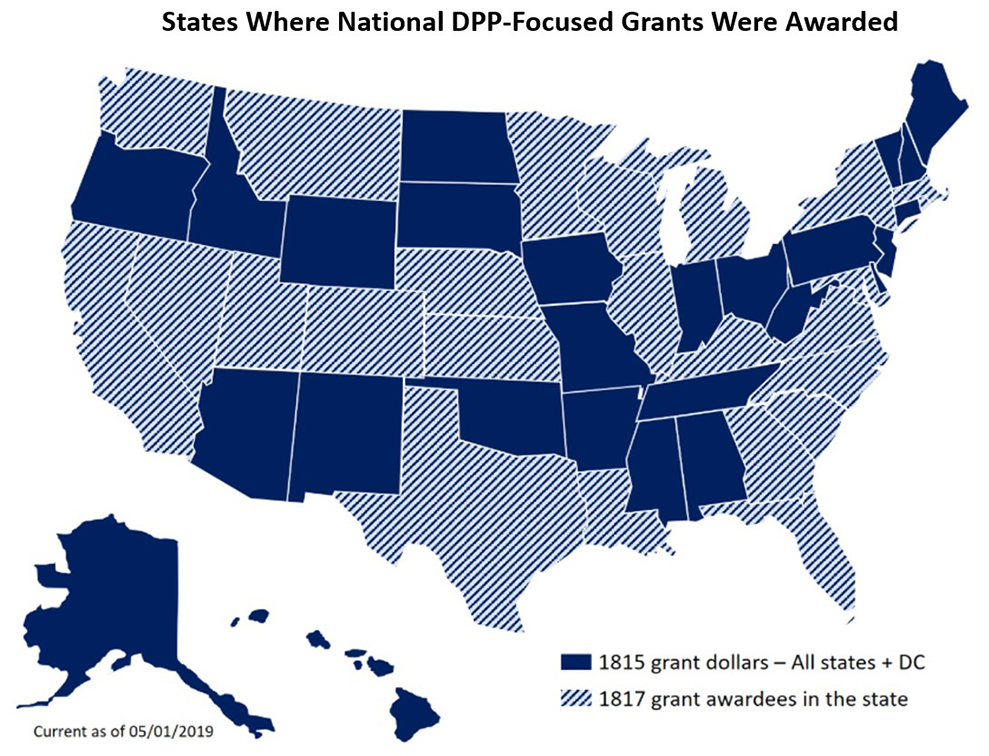The National DPP → Additional Initiatives
Additional Initiatives
This section includes information and resources that can support and sustain the National Diabetes Prevention Program (National DPP) lifestyle change program.
Partner and Community Support
A key aspect of sustaining the National DPP lifestyle change program is generating partner and community support. States should leverage existing resources in building this support, including state health departments, diabetes prevention advisory groups or committees, local Association of Diabetes Care and Education Specialists (ADCES) (formerly American Association of Diabetes Educators (AADE)) groups, local American Diabetes Association (ADA) offices, local and state-level business groups focused on health (e.g., state chambers of commerce, etc.), and other partners.
CDC Cooperative Agreement Investments – Current and Previous
CDC offers many resources for states and other public health practitioners to support the development and evaluation of type 2 diabetes prevention and control initiatives.
CDC Division of Diabetes Translation (DDT): DDT provides national leadership and support for the implementation of a high-impact prevention approach to reducing new diabetes cases by using combinations of scientifically proven, cost-effective, and scalable interventions and prevention strategies directed towards the most vulnerable populations in the U.S. who are most affected by, or at greatest risk for diabetes.
CDC Diabetes State and Local Programs: DDT funds state and local health departments to support programs and activities to prevent or delay the onset of type 2 diabetes and to improve health outcomes for people diagnosed with diabetes.
States and select organizations have received CDC Cooperative Agreement investments to support National DPP activities. Additional information on these activities is provided below.
2320 Grants
Funds 50 states and the District of Columbia, 22 organizations in U.S. counties identified as high need, and four multisectoral partnership networks to prevent or delay the onset of type 2 diabetes among adults with prediabetes and improve self-care practices, quality of care, and early detection of complications among people with diabetes. The work supported under this grant will focus on reducing health disparities and achieving health equity among populations that have systematically experienced greater obstacles to health due to characteristics historically linked to discrimination or exclusion. These characteristics may include, but are not limited to, racial or ethnic group, religion, socioeconomic status, age, gender, sexual orientation, mental health, disability, and geographic location.
1815/1817 Grants
Funded 50 states and the District of Columbia in their efforts to prevent or delay the development of type 2 diabetes in people at high risk and improve the health of people living with diabetes and prevent and manage cardiovascular disease.
Funded 22 state health departments, five large city and county health departments, and two groups of city and county health departments (total 29 awards) to develop new approaches to increase the reach and effectiveness of evidence-based public health strategies, such as the National DPP lifestyle change program, in populations and communities with a high burden of diabetes.

1705 Grants
Funded 12 organizations to build out the National DPP infrastructure in currently underserved areas to ensure that all adults with prediabetes or at high risk for type 2 diabetes have the opportunity to enroll in a CDC-recognized evidence-based lifestyle change program.
Priority programs included working with Medicare beneficiaries and at least one of the following: men, African Americans, Asian Americans, Hispanics, American Indians, Alaska Natives, Pacific Islanders, and non-institutionalized people with visual impairments or physical disabilities.
Other CDC Programs and Initiatives
CDC’s 6|18 Initiative: This initiative targets six common and costly health conditions, including type 2 diabetes, using 18 proven interventions. The diabetes prevention related interventions proposed in the 6|18 initiative include: (1) expanding access to the National DPP lifestyle change program, and (2) promoting screening for abnormal blood glucose in those who are overweight or obese as part of a cardiovascular risk assessment. The CDC authored an evidence summary in support of these proposed interventions that includes several studies supporting the use of the National DPP lifestyle change program.
For more information about the Evidence Summary: Prevent Type 2 Diabetes, click here.
Diabetes Action Plan Legislation: The goal of Diabetes Action Plan legislation is to establish a collaborative process across state agencies to ensure state legislators and other policymakers are strategically taking steps toward reducing the prevalence of type 2 diabetes. This legislation can be used as a strategy to increase coverage for the National DPP lifestyle change program. Agencies typically involved include the Medicaid agency, the state department of health, and the agency responsible for state employee health benefits.
As of September 2016, 17 states had Diabetes Action Plans in place or were actively working on their Diabetes Action Plan. This legislation requires state Medicaid programs, state employee health programs, and public programs to biennially assess the medical and financial impact of type 2 diabetes on the programs and propose solutions for legislatures to consider implementing.









